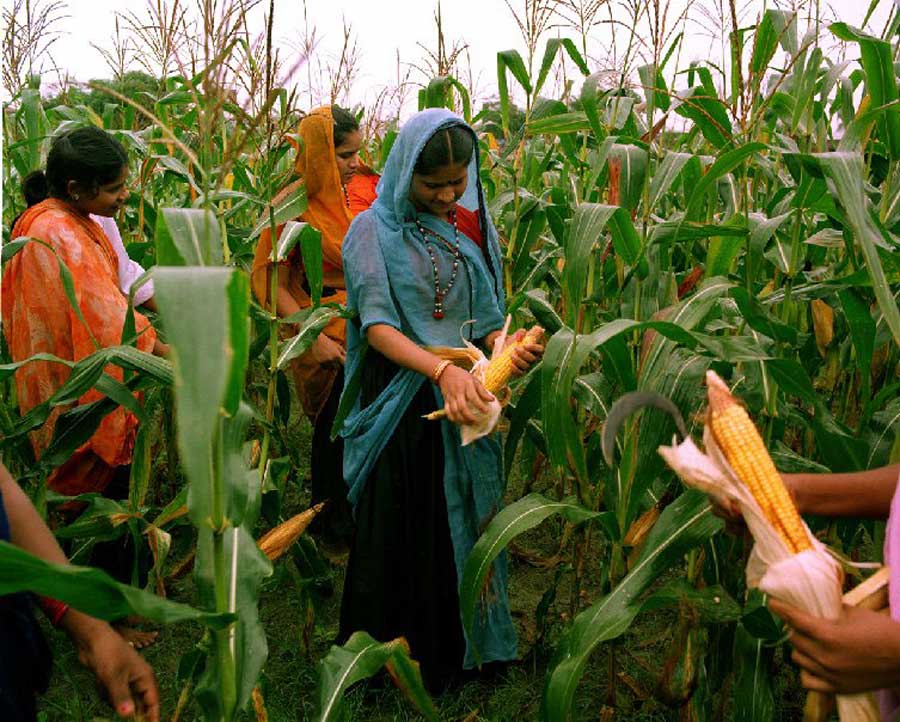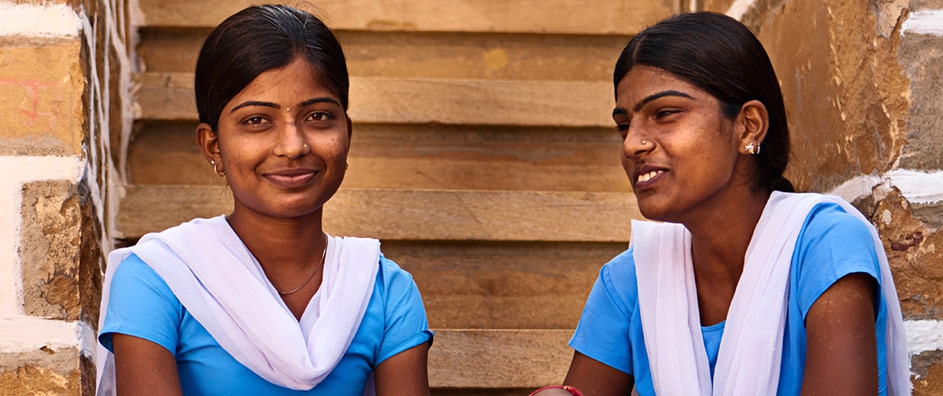The views expressed in our content reflect individual perspectives and do not represent the authoritative views of the Baha'i Faith.
Our dormitory at the Barli Institute, like all the buildings we will visit on campus here in India, has been meticulously prepared for our visit. The students themselves, we are told, have stocked the refrigerator for us with homemade sandwiches, bottled water and a giant plate of quartered oranges. They have also laid out tin plates and saucers for our breakfast. The large, common area of the two-bedroom suite–that Karin, our sons and I will be sharing–is spare, cheerful, and sparkling clean. The batik and block-print curtains and the chair cushions and pillows have all been handmade by Barli students, Yogesh tells us, in the textile design and sewing classes.
After everyone has gone to bed I stand at the window and look out through the barred windows, watching dozens of male employees on their work breaks from the 24-hour call center across the street, smoking, laughing, playing pick-up games of cricket with a broken chair leg for a paddle. I can still hear the echoes of their shouts and whistles as I sit down at the table to go over my notes:
- Of the three hundred million people currently living in poverty in South Asia, 70% of them are tribal and rural women.
- By the year 2016, the number of rural and tribal women living in poverty conditions in South Asia will outnumber the total populations of the United States, Canada and the Russian Federation combined.
- Of the rural and tribal populations in Madhya Pradesh, often called, “the rape capital of India,” nearly half of the women surveyed did not know the name of the country or continent in which they live.
- The average age of marriage for girls is fourteen, with an average family size of six.
- 75% of infants born to tribal mothers die within the first year of diarrhea, dehydration or other preventable causes.
- 86% of tribal mothers and babies are not immunized and most have never seen a doctor.
Yet, somehow, against all these odds, the graduates of Barli have managed to transform themselves from victims of cultural and economic enslavement into agents of positive social change, becoming teachers and trainers who serve the needs of thousands in local health clinics; running their own sewing businesses; operating micro-loan cooperatives; or teaching adult literacy classes. Somehow, in spite of it all, the Barli Institute has been able to fulfill its mission: “To endow each trainee with knowledge, skills and the understanding of gender equality, inspiring moral capabilities with a spirit of service and unity.”
In the world of humanity we find a great difference; the female sex is treated as though inferior, and is not allowed equal rights and privileges. This condition is due not to nature, but to education. In the Divine Creation there is no such distinction. Neither sex is superior to the other in the sight of God. Why then should one sex assert the inferiority of the other, withholding just rights and privileges as though God had given His authority for such a course of action? If women received the same educational advantages as those of men, the result would demonstrate the equality of capacity of both for scholarship. – Abdu’l-Baha, Paris Talks, p. 162.
It’s a tall order, I think to myself, transforming the entirety of a girl’s universe. How, I wonder, given all the obstacles, is it possible to fulfill even a fraction of the ennobling Baha’i mandate?
As promised, Yogesh arrives in the morning at the stroke of seven with Jadhu in tow. Walter and Quin need no introduction or even common language and rush off with him, running down a long lane of mulberry trees, searching for wild peacocks that Yogesh assures them they will see if they keep their eyes open.
Twelve generations of peacock families have lived at Barli, Yogesh tells us, along with flocks of cuckoos and green parrots. There are hundreds of trees on the property to invite them: fruit trees and flowering bushes sharing space with ornamental rosewood, sandalwood, ashoka and karanja, all kept green by sprinklers using recycled waste-water.

Women of the Barli Institute harvesting corn.
It is a tradition, Yogesh tells us, that every Hindu man must plant two trees over the course of his lifetime and care for them very lovingly. At Barli, they also teach the girls to do this. If you go to the villages now, he says, you will see their orchards growing.
I watch my son running wild, his hands full of rocks and sticks, and I see a ghost version of my own childhood in the 70’s when we would spend all day outside unsupervised and show up only when it was time to eat, filthy and delirious, but happy.
“See you at breakfast,” I call to Walter, but he isn’t listening. A male peacock has suddenly opened his tail feathers and is parading along the roof of one of the outbuildings.
Tahera joins us as we cross the fields, and as we walk, we see groups of Barli girls for the first time, kneeling side by side, hard at work in the cultivated vegetable gardens. They are draped head to toe in saris of luminous colors and as they wave and smile at us shyly, their pierced ears and noses and strings of handmade bracelets sparkle with tiny jewels.
They have come here, Tahera explains, from all over India. Sometimes traveling from states as far away as Rajasthan or Chandigarh—often on foot, for hundreds of miles. Aged sixteen to twenty on average, most of them hear about Barli through word of mouth in their villages, and the good news of what the school offers travels fast.
Many of the girls, she explains, arrive with only a set of clothes and a bedroll. But after six months to a year at Barli, even the girl who is lowest in the village hierarchy will acquire the skills that will make her a community elder when she returns home: literacy and numeracy, how to tell time, how to use a computer, how to grow, harvest and dry food from seed in solar powered dryers and cookers, how to prepare compost and farm worms for organic fertilizers, how to dig latrines, how to drive tractors, and how to develop potable water systems—in short, everything she will ever need to know to become a completely self-sufficient farmer, not to mention human being.
It occurs to me immediately of course, that with the exception of knowing the alphabet and being able to type, I have not one of the skills these girls will have by the time they graduate.
Next: Becoming Citizens of the World
















Comments
Sign in or create an account
Continue with Googleor